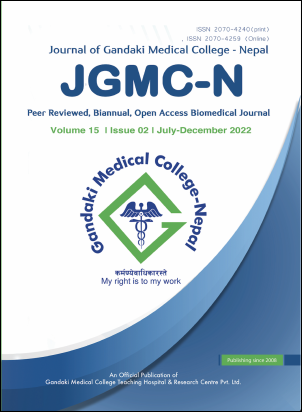Perception of faculties towards online teaching-learning activities during COVID-19 pandemic: A cross-sectional study at a tertiary care center in Eastern Nepal
DOI:
https://doi.org/10.3126/jgmcn.v15i2.48209Keywords:
COVID-19 pandemic, faculties, medical education, perceptionAbstract
Introduction: Online teaching learning activities is totally a new modality of medical education in the country with new opportunities, experiences and challenges. Objectives of the study were to explore the perception of faculties towards online teaching learning activities conducted during the COVID-19 pandemic and to find out barriers and facilitators to conducting online teaching learning activities in our context.
Methods: A web-based cross-sectional study was conducted among medical, dental, nursing and public health faculties using a semi-structured questionnaire. A Google Form was prepared and its link was sent to the faculties via email. Descriptive statistics were calculated using statistical package for the social sciences.
Results: Out of 158 faculties, 105(66.46%) were male and 121(85.44%) were medical faculties. Only 16(10.13%) faculties had received formal training regarding preparing and/or delivering online teaching learning activities. Out of 158, 133(84.18%) faculties faced technical and internet issues. The most common advantage and disadvantage of online teaching-learning activities perceived by the faculties were ‘not limited to time or place’ (149, 94.30%) and ‘lack of interaction with the students’ (130, 82.28%) respectively. Majority (149, 94.3%) of them had positive perception towards online teaching-learning activities conducted during COVID-19 pandemic. Slow internet connection (145, 91.77%) and frequent electricity interruption (131, 82.91%) were the most common perceived barriers to online teaching learning.
Conclusions: Most of the faculties had positive perception towards online teaching learning activities. Academic leaders and stakeholders should provide uninterrupted internet and electricity connectivity, training on online teaching-learning platform and timely technical support.
Downloads
Downloads
Published
How to Cite
Issue
Section
License
Copyright (c) 2022 Deependra Prasad Sarraf, Gajendra Prasad Rauniar, Robin Maskey, Rajiv Maharjan, Ashish Shrestha, Basant Kumar Karn, Shashi Keshwar, Ramayan Prasad Kushwaha, Pramendra Prasad Gupta

This work is licensed under a Creative Commons Attribution-NonCommercial 4.0 International License.
This license allows reusers to distribute, remix, adapt, and build upon the material in any medium or format for noncommercial purposes only, and only so long as attribution is given to the creator.

